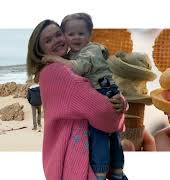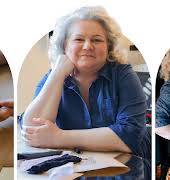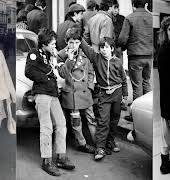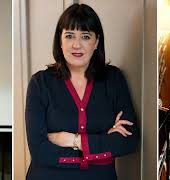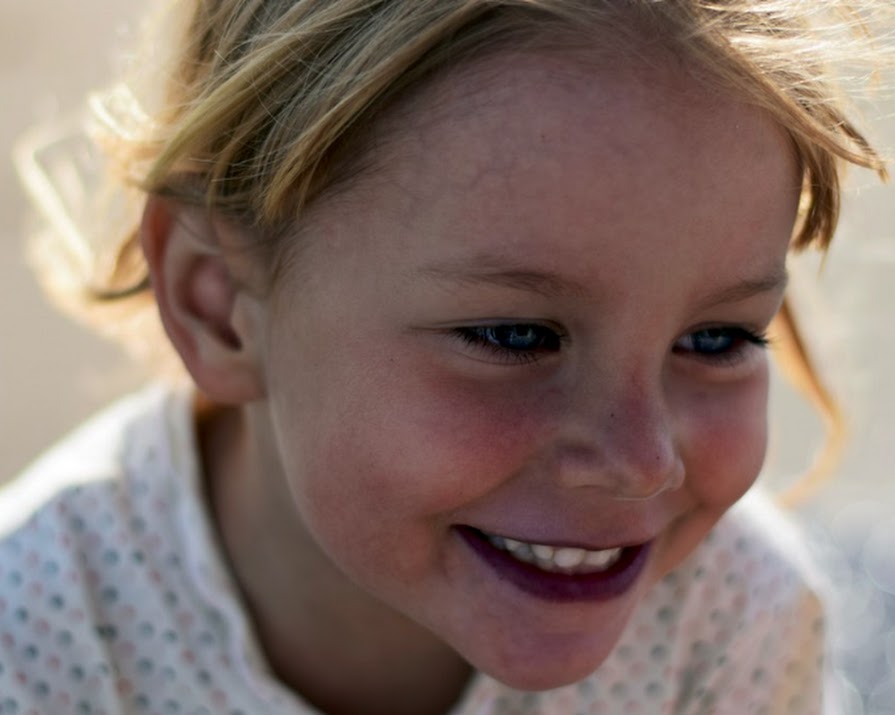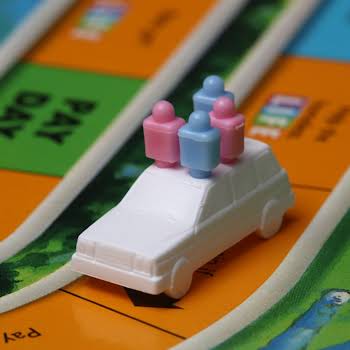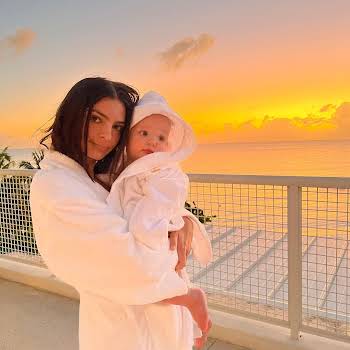
‘I refuse to apologise for letting my child have independence in a safe setting while I read a book’
Are we losing the ability to common-sense parent? Amanda Cassidy asks why today’s parents are sometimes more afraid of what other people deem ‘dangerous’ for our children, rather than relying on our own judgement?
“Is this child being supervised? Who is this child’s mother?” I jolt out of my park bench and sprint the few feet to where my daughter is clutching her knee, crying. The woman looks at me silently but I can hear her inner voice loud and clear. ‘You were slacking as a mum. Stop neglecting your child.’ My daughter is eight and her injury is simply a graze. A quick hug and a fuss, and she is back on the climbing frame with her pals.
Related: The truth about French parenting
But despite the moral judgements from other parents, I refuse to apologise for letting her have independence in a safe setting while I read a book. She has a right to the freedom that I have risk assessed on her behalf as her mother, and I am ok with the levels of ‘danger’ I have exposed her to.
Would I leave her alone in a swimming pool? Of course not. Is her age a factor? Definitely. These are the distinctions I’ve made based on my responsibility as a parent to keep her safe, yet also capable and independent.

But I wasn’t always so confident in my parenting decisions. Second-guessing ourselves is second nature when we first become parents. Often our immediate thoughts turn to how others will perceive our parenting. But this just ends up clouding our own instincts.
Such often-irrational social norms are spoiling our children’s rights to experience the real world without a parent-shaped blanket wrapped around them. Of course, our job is to keep them safe, well and to show them the way, but extreme levels of conformity and the need to seek approval from our social groups can sometimes make us act against our own judgement.
Extreme restraints on children and the shaming of their parents if they don’t conform have reached fever pitch in the US.
‘Just this once’
US-based Kim Brooks is an author and mother. She wrote an essay for the New York Times called Motherhood in the Age of Fear about her experience of being vilified for a decision she made. She left her four-year-old son in her car alone for five minutes while she ran into a shop to pick up a pair of headphones.
“I took a deep breath. I knew what I was supposed to do. But I was tired. I was late. I didn’t want, at that moment, to deal with a meltdown. And there was something else: a small, quiet voice I’d been hearing more and more lately. “Why?” the voice asked. Why did I have to fight this battle? He wasn’t asking to Rollerblade in traffic. He just wanted to sit in the car. Why couldn’t I leave him, just this once?
Related: Things fall apart: As a parent, doing nothing is the hard option to choose
If it had been warm out, I would have said no. I knew about how quickly a closed car can overheat, even on a 60-degree day. But it was cool and cloudy. I’d grown up in that same town in the 1980s and had spent hours waiting in the back seat of my parents’ station wagon, windows open, reading or daydreaming, while they ran errands.
Had so much really changed since then? So I told him I’d be right back. I cracked the windows and child-locked the doors and set the alarm. When I got back five minutes later, he was still playing his game, smiling.”
But someone had noticed and decided to take action. They took Kim’s car registration number and reported her to the police. She was later charged with a crime with the delinquency of a minor and had to complete over a hundred hours of community service.
Fear of judgement
“I felt like a terrible mother. I felt as though I’d been caught doing something very bad, even if I didn’t understand what the bad thing was, exactly, or what the rationale was for its badness.” Kim explained. ” I felt, I think, what just about every woman feels when someone attacks her mothering: ashamed. But had I committed a crime?
There’s no law in Virginia against letting your kid wait in a car — though, amazingly, 19 states do have statutes addressing this situation. The police seemed to think it was child abuse or neglect — that someone could have hurt or kidnapped my son while I was gone. When I tried to explain this to my outraged father, he said: “Last I checked, kidnapping is a crime. Someone could break into my house and shoot me in the head, but the police aren’t showing up to arrest me if I forget to lock my door.”
Kim’s article is an important reminder of how swiftly and energetically mothers are demonised for making the decision many of us make at some point. Maybe we don’t all agree with her, or maybe we’ve done it but just can’t admit it.
It has reached the stage where we don’t know if we are afraid for our children, or afraid other people will be afraid and judge us for our lack of fear. In other words, risk assessment and moral judgment are being intertwined.
The NYT article continues, “Yes, child abuse and domestic violence remain a serious problem in America, but we should never conflate that abuse with what many Americans still consider traditional parenting in a free country. We must demand better training and education for child protective workers and police officers on what is true “child abuse and neglect.” The article has currently over 2500 comments already, showing the divisive nature of this topic.

Crowd psychology
We spoke to Tanya Ward from the Irish Children’s Rights Alliance. She says in Ireland it is slightly different. “There is nothing in law specifying at what age you can leave your child unattended. This is because all children are different in terms of maturity and capacity. However, a parent could be found guilty of child neglect under the Children’s Act depending on the circumstances.”
But why are the pull of these social norms just so strong? David Kavanagh is a psychotherapist in Dublin. He says that we are evolutionarily hardwired to fear rejection from our peers.“In the past, those who went against the tribe didn’t fare so well. As a consequence, we need to make sure we agree with the value system of the tribe. Those fears still exist today. The problem is that now we are starting to be ok with the idea that other people know what’s best for our kids rather than us.”
Peter Gray is a child Psychologist with Psychology Today. He says that our current norm of extreme protection of children has become, unfortunately, not just a social norm, but a moral norm. “If you don’t watch your child (or have some other responsible guard watching) every minute, you are, in the eyes of many people, doing something immoral.”
He says we need to trust that parents know best. “As recently as 30 or 40 years ago it was still standard practice for parents to shoo children out of the house, where they would find other children and play to their hearts’ content. Over the last few decades, however, social norms have gradually developed that prevent such play.”

Risk Assessment
Naturally, letting your child remain in the car while you run into the shop isn’t exactly encouraging free-range play, but it is an example of how a parent’s personal risk assessment for their child is being judged by outsiders. Times may have changed over the years – but not that dramatically. News and social media would have us believe that every child that walks alone is going to be kidnapped, abducted, lost, or taken.
We choose to hone in on the rarest of the rare dangers rather than some of the more clear and present dangers to our children like obesity or diabetes. That’s why children are not out building forts or having adventures on their bikes out of sight. Instead, they are plugged-in, overprogrammed, cordoned off from any remote possibility of danger, and any parent who seems to ‘violate’ that norm is deemed neglectful.
A ‘moral’ issue?
Similarly, we can’t let moral judgements cloud our own reasoning. Scientists at the University of California carried out an interesting study of over 1500 adults from various backgrounds. The researchers informed them that an 8-year-old was left alone for 45 minutes reading a book in a café a block away from her parents. Participants gave the situation the most common danger rating of 10– the most extreme danger possible. The most interesting part was the back story. The participants were told two versions of the story. One was that the child was left alone because of an unavoidable accident that delayed the parent. The other story was that the parent had deliberately left the child alone. The danger figures were much higher for the child whose parents ‘deliberately’ left the child alone. This means that participants inflated the level of danger due to the moral nuances of the situation – as a way of punishing the parent for violating what they perceived to be a moral imperative – that of always watching one’s child. This is despite common sense dictating that a parent who left their child alone on purpose would have taken precautions about their safety or known they were mature enough to handle the time alone.

Irrational Fears
Barbara Sarnecka is a cognitive scientist at the University of Calfornia who carried out the study. She says we need to rethink what it means to protect our children. “What has changed seems to be social norms, moral judgments, the idea that children should never be left alone and that a parent who leaves a child alone is negligent or abusive.” She also spoke about the case of Kim Brooks.
“Reading about the incident, I was struck by how the passerby, the police and the court all seemed to share the assumption that the child alone in the car was in terrible, imminent danger — which is just not objectively true.”
“It’s not that unusual for a lot of people to share the same irrational fear. For example, a lot of people are afraid to travel in aeroplanes, but not in cars, even though planes are much safer than cars. What’s interesting about this phobia about leaving a child alone is that (1) it is so widely shared, and (2) it has acquired the force of law —Brooks was charged with a crime for allowing her child to be alone in circumstances that were, in her judgment as a parent, age-appropriate and acceptably low-risk. I think the safety data show that her judgment was correct. As an analogy, imagine that you suddenly find yourself in a world where the fear of flying has become so common that parents who are seen trying to board a plane with their children are charged with child abuse, even though flying is actually not very dangerous.”
Free-range parenting
Now, there is a shift happening in child-rearing norms. Parents who take a more laissez-faire approach are known as ‘free-range’ parents and the laws in the US are starting to catch up. Dr Dave Anderson from the Child Mind Institute says it comes down to a case by case basis.
“If your 12-year-old is capable of walking home from the bus stop by themselves, that’s something that you might make a decision about, whereas another 12-year-old may be too impulsive.”In other words, use your common sense. But isn’t this a decision should ultimately be decided by the parent rather than a legislator in the first place?
In fact, every parent I spoke to about feeling judged over perceived parenting had a story to tell. One mother said she stopped her children gleefully sprinting down the beach naked on holidays because she felt that people would think she was a bad mother. Another dragged all three of her children out of the car and into the garage to pay for petrol to avoid any strange looks even though two of them were asleep and she could see them through the window for the 50 seconds she was not with them.
Both mums appraised the situation and yet went against their instincts because they were afraid of what others thought. Nobody is saying that leaving your children alone in the car is the right thing to do– but letting common sense prevail in certain situations is what instinct is all about.

Unhelpful hysteria
Kim Brooks essay, Motherhood in the Age of Fear struck a chord with me. I remember fondly a childhood spent largely outdoors, and free of parental supervision. We spent hours outside, fighting, resolving, compromising and learning how to deal with the world ourselves in child-size bites. When people begin to cast themselves as critics and judges of other people’s children, the supportive qualities of motherhood disappears. Let the judgement of women for perfectly rational parenting decisions end. I know my children’s limits. I know that they see the bicycle racks outside the supermarket as a climbing frame and I’m ok with that. I deem it safe, nay, fun for them to tumble around on them as we walk past.
I’ll let my six-year-old go back to the vegetable aisle to pick up something I’ve forgotten on his own without any hysteria over ‘stranger danger’. I am comfortable deviating from the normative hyper-parenting of today and you should be too.
Let’s stop fear ruling our every parenting move. Let’s do away with the judgemental mentality of other parents. Let’s instead embrace common-sense, paranoia-free, and instinct-based parenting.
Image via Unsplash.com
Read more: None of my friends find parenting this difficult
Read more: Peaceful parenting: Who has time for that?
Read more: The only parenting book you’ll ever need in your life


